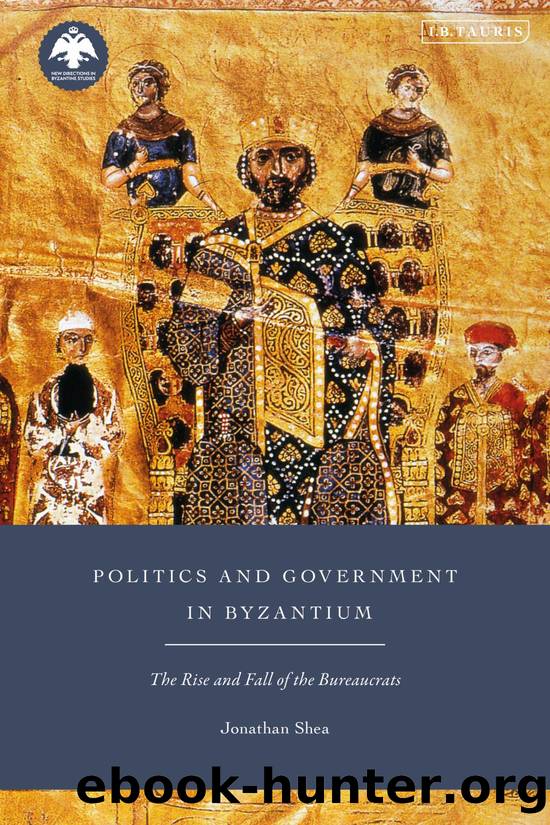Politics and Government in Byzantium by Jonathan Shea;

Author:Jonathan Shea;
Language: eng
Format: epub
ISBN: 9780755601950
Publisher: Bloomsbury UK
4
The collapse of civilian government, c. 1066âc. 1133
More than anything else the emperor desired to increase the public funds and to supervise private trials, even if it meant devoting the greater part of his reign to these efforts. ⦠As a result, Roman society was shaken by sycophantic accusations, sophistic tricks, a swarm of judicial technicalities, and the complexity of bureaucratic procedures. 1
The inspiration behind the opening quote of this chapter from Attaleiatesâs History is the fact that I think it encapsulates most modern views of the eleventh century, as a period of general mismanagement which gradually undermined the empire from within at the same time that it was being threatened from without. As noted in the last section, the sigillographic material for the earlier parts of the eleventh century presents almost no evidence for wanton mismanagement, and rather more for a careful restructuring of the Byzantine government to fit the needs of the eleventh-century empire. While there is some evidence for maladministration of the type described by Michael Attaleiates and Michael Psellos in the period covered by this chapter, especially during the reigns of Michael VII and Nikephoros III, the seals present a more nuanced picture. There is no evidence for indiscriminate promotion, and little for the leaps up the hierarchy described by Attaleiates.
The last decades of the eleventh century saw changes to the nature of office-and title-holding that have an impact on our means of analysing the imperial government. Firstly, during the reign of Nikephoros III Botaneiates the empire became so short of money that he had to stop paying rogai. As we have seen, many Byzantine bureaucrats derived considerable income from their titles, so the impact of this change must have been devastating, especially after years of currency debasement. For us this presents a problem because we can no longer use income as a method of determining the relative importance of various offices after c. 1080. I will still include these calculations where I think they are illuminating, but they are only valid for the first decade and a half of the period covered by this chapter. Secondly, during the 1080s Emperor Alexios I Komnenos began an overhaul of the titles of the empire, creating a new system which placed his family and allies over everyone else. It took decades for this new system to reach maturity, but the essentials were put in place during the 1080s, and we can see the changes it wrought almost immediately in the sigillographic record. To some degree the old system continued to exist into the twelfth century, but as a second-class set of dignities for those without imperial connections. We can account for this when assessing status, but it must be borne in mind that the hierarchy under the Komnenoi was completely different from that under their predecessors, and that direct comparisons might be misleading.
The aim of this chapter is to address three questions: What evidence is there for the sort of mismanagement recorded in the histories of the period?
Download
This site does not store any files on its server. We only index and link to content provided by other sites. Please contact the content providers to delete copyright contents if any and email us, we'll remove relevant links or contents immediately.
Celtic Warfare: From the Fifth Century BC to the First Century AD by Gioal Canestrelli(509)
Armies of Dark Ages Europe, 613-987: Charlemagne, the Carolingians and Their Enemies by Gabriele Esposito(434)
Journeys to England and Ireland by Alexis de Tocqueville(301)
Waterloo by Tim Clayton(297)
Armies of the Napoleonic Wars by Gregory Fremont-Barnes(283)
Violence in Ulster : an oral documentary by Van Voris W. H(269)
Captives and Their Saviors in the Medieval Crown of Aragon by Jarbel Rodriguez(253)
War in Ukraine Volume 2: Russian Invasion, February 2022 (Europe@War) by Tom Cooper Adrien Fontanellaz Edward Crowther Milos Sipos(250)
A Polish Son in the Motherland : An American's Journey Home by Leonard Kniffel(233)
The Sabotage Diaries by Katherine Barnes(230)
Medieval Bruges, c. 850–1550 by Brown Andrew & Dumolyn Jan(227)
The Templars at War by Zvonimir Grbasic;(222)
Irish Historical Allusions, Curious Customs and Superstitions, County of Kerry, Corkaguiny by Patrick M. Foley(215)
The Bloody Red Hand by Derek Lundy(209)
Passage to Byzantium: The Romanov-Habsburg Feud that Led to World War I by Maggie Ledford Lawson(198)
Holy Roman Empire Power Politics Papacy by Anne Davison(192)
The Great Shame: And The Triumph Of The Irish In The English -Speaking World by Thomas Keneally(190)
Kicked Out of Heaven Vol. III: The Untold History of The White Races Cir. 700 - 1700 a.d. (The Dragon Book 3) by Keenan Booker(188)
The Medieval Soldier in the Wars of the Roses by Andrew Boardman;(185)
